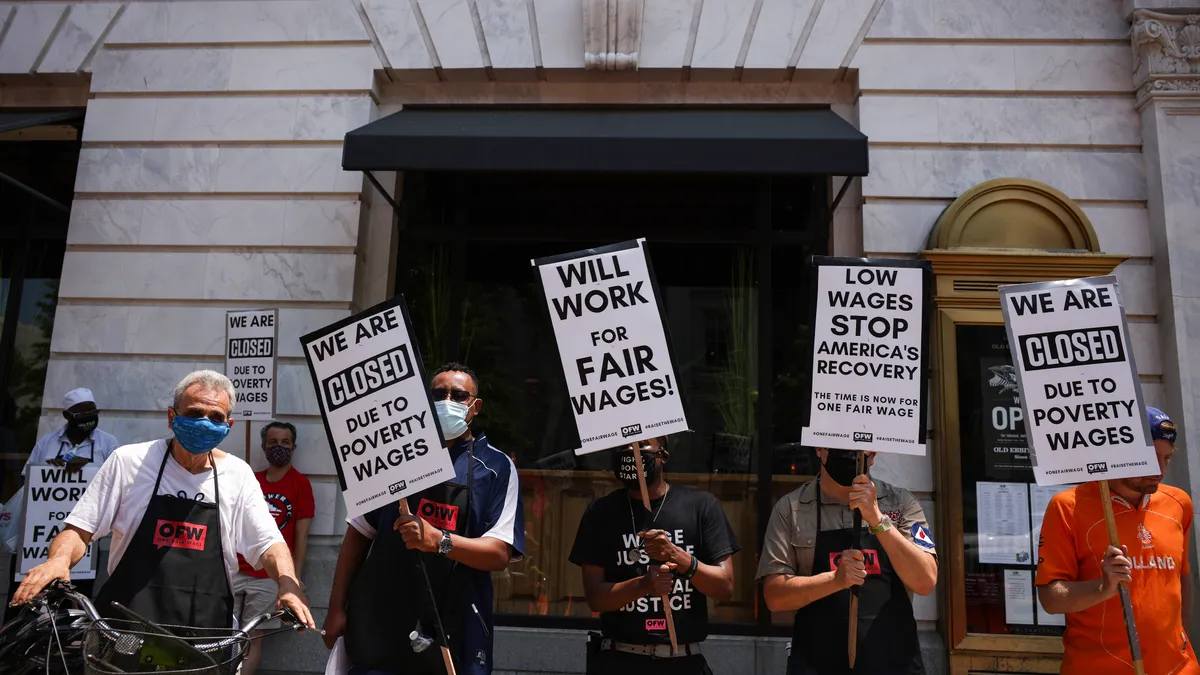Dive Brief:
- The day after the D.C. Board of Elections approved the language of a new initiative to end the tip credit, One Fair Wage and other advocacy organizations released a poll from Lake Research Partners showing 88% of D.C. restaurant workers support the new initiative. The survey reached 300 people who work as servers or bartenders in the city.
- Initiative 82 would end the tip credit by 2027, raising the mandatory base wage — now $5.05 an hour, indexed to inflation — to parity with the city's minimum wage over that period, which is currently $15.20 an hour, indexed to inflation. OFW and other supporters must now gather signatures to ensure the measure appears on the ballot in D.C.'s primary election next June.
- Initiative 77, a similar initiative that would’ve eliminated the tip credit, passed in a citywide referendum in 2018, but was overturned by the D.C. City Council. Supporters say, however, political and economic changes rooted in the pandemic mean this measure is more likely to succeed.
Dive Insight:
The 2018 ballot initiative was largely framed as a tool to combat poverty and raise wages, which opponents vehemently contested. Supporters of this year's effort, Initiative 82, say higher wages are needed to end the labor shortages facing restaurants.
Ifeoma Ezimako, a D.C. restaurant worker, appeared in a pre-recorded video at the webinar Tuesday hosted by OFW, said she, and other workers like her, were dissatisfied with pay and conditions in the industry.
"It's just not worth it to come back for anything less than a full minimum wage, plus tips," Ezimako said. She also said many workers were driven out of the industry when they were unable to qualify for unemployment benefits earlier in the pandemic.
Michael Lastoria, CEO of &pizza and vocal advocate for higher wages, emphasized the depth of the labor problem. Nationwide, foodservice employment lags behind pre-pandemic numbers, and tens of thousands of workers left the industry in August.
"The foodservice and restaurant industry has a massive crisis on our hands," Lastoria said.
Lastoria said his company has expanded dramatically during the pandemic and that it has not faced staffing issues because it pays a minimum wage, plus tips.
Ballot Initiative 82 was introduced by Ryan O'Leary, an organizer with One Fair Wage and former restaurant worker, who helped coordinate the campaigns to pass Initiative 77.
In 2018, critics of Initiative 77 said it would force many restaurants to close or raise prices. When it was introduced, several restaurant service workers opposed it, particularly the group Save Our Tips. It argued eliminating the tip credit would reduce pay overall, as employers would switch to charging a mandatory service charge.
Industry groups spent hundreds of thousands of dollars to stop the measure, according to WAMU, saying the measure would force businesses to close and that it was redundant because the law already requires employers to pay at least the equivalent of the minimum wage.
Initiative 77 passed in a primary election in June 2018. By October, Phil Mendelson, chairman of the D.C. City Council, said the initiative was "misleading at best, dishonest at worst." It was overturned by a vote of the D.C. City Council that month, an act which critics like Tom Perriello, executive director of the Open Society Foundations’ U.S. programs and former Congressman, decried as undemocratic.
Saru Jayaraman, One Fair Wage president, announced the group would begin collecting signatures to get Initiative 82 on the ballot. Jayaraman said she was confident it would pass, and this time, the D.C. City Council would not overturn it, citing the election of Janeese Lewis George, who campaigned against the tip credit. Jayaraman also said some politicians who opposed Initiative 77 may not oppose Initiative 82, although she did not provide additional details.
"We've even talked to staff of council members who had previously overturned [Initiative 77], who have told us that this council is not going to overturn this ballot measure," Jayaraman said.
The pandemic's impacts may provide additional momentum to the effort this time around. The labor shortage, OFW argued, has already forced many employers to raise wages to levels once thought unsustainable. OFW believes this could reduce some of the resistance to Initiative 82.
Jayaraman cited a report released Monday by OFW, which examined wages before tips in job postings of over 1,600 restaurants nationwide, which showed at least 85 restaurants in D.C. now pay a base wage of $15 or higher. Jayaraman said many of these businesses had begun offering these wages as a way to attract employees.
The efforts also have backing from The Open Society Foundations, a nonprofit that provides funding to other nonprofits, which said it would provide upwards of $200,000 to One Fair Wage. During the webinar, OFW said it would use the money to finance its campaign in support of Initiative 82.
California and several other states do not have the tip credit, and require restaurants to pay the full minimum wage. A 2018 study from the Economic Policy Institute found the states without the tip credit tended to have higher wages for service workers.










